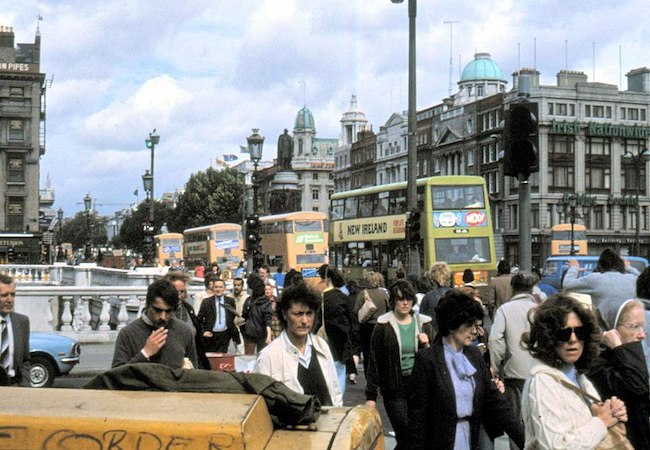Strategic business decisions — not the luck of ancestors — created a modern, burgeoning Irish economy
St Patrick’s Day, Ireland and World

By Michael Davis
Planning a St Patrick’s Day party? Why not whip up some corned beef and cabbage tacos? Seriously. They’re not bad.
Of course, if you want to stick with the traditional sides, that’s fine too. You can’t go wrong with a buttery dish of colcannon and a pint of Guinness. Either way, though, let me tell you how, on my last trip to Ireland, a plate of corned beef tacos helped better understand that country’s special place in the world.
My tacos were served just a couple of weeks ago in a charming country house in rural County Donegal—a spectacularly beautiful place in the far northern part of the Republic of Ireland. (If you’re planning a vacation, Google “Wild Atlantic Way”. But be forewarned, the views will make you want to extend your trip.) My hosts were an American family who moved to Ireland more than 2 years ago to work for a big American corporation.
As far as I can tell—and I’ve known them for a very long time and visit often—they love the place. But one of them was born here in Texas. She knows that if you can’t make something into a taco, it probably isn’t worth eating. Hence our dinner.
Now in truth, corned beef tacos are still a rarity in Ireland. Americans working for U.S. corporations are not. There are almost 1,000 US companies who have significant operations in Ireland. Directly and indirectly, they employ over 360,000 people, a lot of them American citizens working abroad but most of them Irish. American firms in Ireland generate about 15% of all Irish jobs.
It wasn’t always like this. Many Americans think of Ireland in vaguely romantic terms — the ancient land of our ancestors, home to myth and legend, that sort of thing. And it is true that about one-in-four Americans can trace significant ancestry to Ireland. But we need to understand an important distinction: Ireland is an old culture but the Republic of Ireland is a young country — an independent state for just over 100 years.
For the first 40 years or so following independence, Ireland turned inward. They discouraged foreign entanglements, tried to wall themselves off economically from the world and sought a kind of Irish self-sufficiency. After centuries of colonial rule and bitter, bloody civil war, it’s easy to see why the newly independent Republic would set out in that direction.
But it was a bad plan.
By the 1950’s Ireland was nearly the poorest place in Europe. With grim prospects at home, anyone who could get out, got out. Between 1945 and 1960 about 500,000 Irish emigrated, many of them to the U.S. The population of Ireland in 1961 was smaller than it had been after 1861, some 15 years after the great potato famine.
In some poor places, it’s easy for the leaders to see what needs to change but impossible for them to change. Ireland was bold. Instead of looking inward, they embraced the global economy. They slashed corporate taxes to encourage investment. But they didn’t just want foreign money, they wanted foreign partnerships. They wanted real companies to come to Ireland and do real things. That meant they couldn’t just promise low taxes and light regulation, they had to invest in infrastructure and education. Ireland is now ranked No. 5 in the world for higher education.
So, how’s all that working out for them? Pretty good. Ireland hasn’t yet become the Singapore of the North Atlantic but it is no longer the poor man of Europe. By some measures Ireland is nearly the richest country in Europe. Other metrics put them in the bottom of the top third.
But more than the current ranking, there’s optimism for the future. If you work hard to educate young people in useful high-tech skills, you attract a bunch of foreign tech firms — Apple, Google, Microsoft and Meta are the four largest multinationals in Ireland. Not surprisingly, when a bunch of smart Irish kids go to work for these companies, a few of them start dreaming about starting their own companies. What’s called “Silicon Docks”— the area in the old Docklands part of Dublin — may not rival Silicon Valley in size but it does in spirit.
There’s a lot more to say but let me end by going back to that dinner in Donegal. My hosts know their tacos. They could have served chorizo or al pastor, but they gave me corned beef. They offered me Irish tacos. And just like that dinner, Ireland is embracing the world but in an Irish way. I think St Patrick would approve.
Michael Davis is an economics professor at the Cox School of Business, SMU Dallas.




